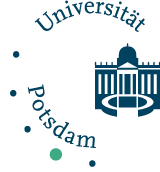Doctoral Researchers

Eva Schindler
Master of Public Administration / Master of Public Affairs
Campus Griebnitzsee
DFG-Research Training Group "WIPCAD"
University of Potsdam
Department of Economics
and Social Sciences
August-Bebel-Straße 89
14482 Potsdam, Germany
Office: Campus Griebnitzsee, House 7,
Room 3.07.211-15
Research topic
“Practices and narratives in the implementation of participation mechanisms in urban development programs”
Curriculum vitae
STUDIES & EDUCATION
Since 10/2014
Doctoral researcher at Potsdam University and DFG-Fellow in the Research Training Group “Wicked Problems, Contested Administrations – Knowledge, Coordination, Strategy” (WIPCAD)
2007 – 2009
Master of Public Administration / Master of Public Affairs (Dual Degree), London School of Economics and Political Science / Sciences Po Paris
2003 – 2007
Bachelor of Arts in European Studies, University of Passau, Germany
PROFESSIONAL EXPERIENCE
Since 03/2018
Research Associate, Chair of Organizational and Administrative Sociology, Potsdam University
2016 and 2017/2018
Assistant Lecturer (temporary), Potsdam University
2009 – 2014
Consultant / Senior Consultant, Prognos AG, Berlin
2009 – 2010
Consultant (freelance), Electricité de France, Paris
2009
Research Assistant, Centre for Economic Performance, London School of Economics and Political Science, London
2008
Intern, Prognos AG, Berlin
2006
Intern, German Agency for Technical Cooperation (GTZ, today German Agency for International Cooperation GIZ), Eschborn
2005/2006
Intern, German Agency for Technical Cooperation (GTZ, today German Agency for International Cooperation GIZ), Quito
RESEARCH INTERESTS
- Decentralization and local governance
- Participation and co-production
- International urban development policies and programs
- Ethnographies of the state
- Interpretative research
- Sociology of practice
- Sociology of translation
TEACHING
Winter term 2018/2019
Introduction to organizational and administrative sociology (taught in collaboration with Max Oliver Schmidt), BA-level seminar, Potsdam University
Summer term 2018
A practice-theoretical perspective on organisations (taught in collaboration with Max Oliver Schmidt), BA-level seminar, Potsdam University
Winter term 2017/2018
Introduction to organizational and administrative sociology, BA-level seminar, Potsdam University
Summer term 2016
Panacea participation? Opportunities and limitations of citizen participation, BA-level seminar, Potsdam University
Abstract
Practices and narratives in the implementation of participation mechanisms in urban development programs
The doctoral research focuses on the narratives and practices of local, national and international bureaucrats in the implementation of participatory mechanisms in urban development programs in Uganda. Developing from a “buzzword” (Cornwall and Brock, 2005) to a “dogma” (Spies, 2009) in development policy, participatory mechanisms almost inevitably form part of the so-called “governance” of international development programs, despite known dangers of elite capture and institutionalisation of existing (unequal) power structures in participatory projects. (de Wit and Berner, 2009; Dill, 2009; Mosse, 2001; Rigon, 2014). Focusing on induced participation (Mansuri and Rao, 2013), this research examines the case study of Municipal Development Forums, participatory governance mechanisms which were established in selected municipalities in Uganda as part of the Cities Alliance programme “Transforming the Settlements of the Urban Poor in Uganda (TSUPU)” and expanded in scope in the framework of the World Bank programme “Uganda Support for Municipal Infrastructure Development (USMID)”. Rather than focusing on the often-criticized gap between the rhetoric and reality of citizen participation, and heeding Cornwall’s call for “clarity through specificity” (Cornwall, 2008) in the study of participation, the doctoral research analyses the context-specific meanings attached to participation by different collective actors and the organizational logics driving practices in the implementation of Municipal Development Forums. It further highlights the importance of interorganizational relations in a field characterized by a multiplicity of organizations, collective actors, and stakeholders. (Mosse, 2004) Methodologically, the research takes a constructivist-interpretive perspective and draws on the methodological toolkit of organizational ethnography, combining observation and qualitative interviews collected in several months of fieldwork.
